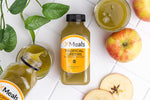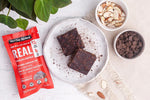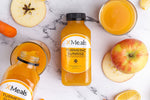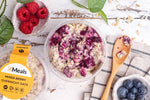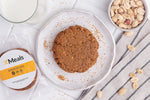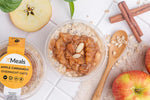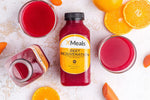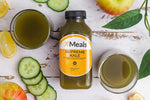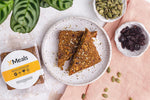
Considering going full plant-based or simply interested in the idea? Welcome! The plant-based world is huge and diverse, and it’s easy to get a little bit lost. Find out what foods plant-based diets include and the various benefits of a plant-based diet. We'll also give you some insight into how this diet is different from veganism or vegetarianism as the three are often mixed up! Of course, we'll dive into nutrition as it plays a huge role in plant-based diets.
Don’t fret, your friends at XMeals are here to guide you to the best of our abilities. We’re all in this together!
What is a Plant-Based Diet?

A plant-based diet is a diet mainly based on plants. It’s actually a wonderful way to get into a vegetarian or vegan diet (which are stricter in comparison), without having to quit certain foods and drinks cold turkey. It’ll get you used to switching out and looking for better alternatives to your usual ingredients.
Unlike veganism, a plant-based diet can actually also include the consumption of meat, dairy and egg products. Typically, it emphasizes on foods derived from plants, such as vegetables, fruits, whole grains, beans, seeds and nuts. Therefore, a plant-based diet is characterized by a high intake of whole plant-based foods and a much lower intake of meat, seafood, dairy and refined products.
But a plant-based diet isn’t just about the ingredients. It’s about nutrition, too. There are numerous reasons why a person would opt to go plant-based (we’ll get to that in a bit), but they will almost always boil down to the health benefits.
Why Do People Go Plant-Based?

There are many reasons why people go on a plant-based diet! Some do so because it makes them feel better. There are a lot of processed foods out there and lots of artificial ingredients. Going plant-based gives people more control over what they put in their bodies. A plant-based diet focuses on whole foods and grains, which are typically much less processed and free from artificial nasties.
Another reason people go on a plant-based diet is for the environment and the planet. Plant-based foods are typically more sustainable and require fewer resources to produce. Resources like food, water and land can be used for planet-friendly alternatives rather than being used solely for livestock care. In fact, if we all went plant-based, research suggests we could free up 75% of agriculture space. That’s a whole lot more space for conservation programmes and growing more crops to feed the global population!
Another reason is weight loss. On a plant-based diet, you eat fewer foods that are packed with saturated fats such as processed meats, heavy creams, cheeses and desserts, which can lead to all sorts of health problems. By following a plant-based diet, you’re naturally consuming more wholegrain natural foods that are typically lower in saturated fats and packed with nutrients. So it’s easy to see how these diets can facilitate natural and healthy weight loss!
Is a Plant-based Diet the Same as a Vegan or Vegetarian Diet?
We’ll save you a few google searches and sum it up here. No. A plant-based diet is not the same as a vegan or vegetarian diet.
Some people associate a plant-based diet with one that eats minimal amounts of animals and animal byproducts. In this study, it was found that only 50% of the participants considered a plant-based diet to be one that excludes any animal products!
With half of the participants not knowing what the full extent of a plant-based diet could be, imagine what other people might think! So, when you hear about a plant-based shop or restaurant, it’s best to find out if they’re 100% plant-based to avoid any confusion. Speaking of 100% plant-based, the food here at XMeals contains no animal products or dairy!
If you’re still a bit iffy, here’s a basic rundown of what the three diets consume and exclude. A vegan, vegetarian, and plant-based diet can’t all mean the same thing - that’s why they’re named differently!
1. Vegan
100% plant-based and possibly the strictest among the three diets. No meat, poultry, fish, seafood, dairy, honey, and eggs are eaten. Leather and other products derived from animals are also excluded.
2. Vegetarian
This is a lighter version of a vegan diet. Some argue that this is exclusively a plant-based diet, but all vegetarians consume eggs and dairy. Those who eat fish are considered pescetarians.
3. Plant-Based
A plant-based diet isn’t restricted to eating fruits and vegetables. A plant-based diet can include animal products such as meat, eggs and dairy, but a stricter 100% plant-based diet can exist depending on the person following the diet.
What to Eat On a Plant-Based Diet?

With a 100% plant-based diet, you can still get your three meals a day squared away plus snacks! Let’s walk you through what a day with the diet looks like.
For breakfast, sit down with a big meal like this Tofu Rancheros Breakfast Bowl. If you’re on the move, a Modern Meat Breakfast Wrap will do. If you think you can’t have a bowl of cereal, think again! There are many types of plant-based milk that you can enjoy with your fave whole grain cereals. Plus, you don’t have to skip your morning brew either. Plant-based creamers and sweeteners are actually easy to find now if you want to customize your coffee.
For lunch and dinner, of course, you can start off with a salad like this West Coast Crunch Salad. A savoury selection like a Buffalo Cauliflower Bowl will also hit the spot whether you’re at home or the office. If you want something creamy and perfect for the family, get a Plant-based Mac and Cheese!
Snacks, sides, drinks, and dessert? No problem! Cookies, fudge bars, and brownies can be made from a plant-based recipe. You don’t have to miss out on them! Nuts and seeds, while great for snacking, can certainly be replaced with a baked treat. For drinks, what better one to get than a refreshing fruit juice?
If what we just went over sounds like a normal day for you, then that’s great! The whole goal of a plant-based diet is to make a positive impact on your life and the planet while not skipping out on health and flavour.
What are the Risks of a Plant-Based Diet?
What does plant-based mean when it comes to nutrition? You know the pros, but now we need to talk about some cons. Don’t worry, they can be managed!
One particular concern when practising a plant-based diet is a lack of protein. However, if you plan your meals you should be able to get plenty! For example, in 100 grams of ground, lean beef, there are roughly 36 grams of protein. Popular plant-based alternatives like tofu, seitan, tempeh and edamame can actually provide between 12-25 grams of protein for the same serving. Not to mention that they’re also great sources of fibre, selenium, and small amounts of calcium, iron, magnesium and phosphorus.
Calcium is another common nutrient that people on plant-based diets miss out on. Milk is a source of calcium, but it’s not the only source of it! Bok choy, kale, broccoli, chickpeas, and some enriched plant-based milk and cheeses will get you some calcium. You can also find many supplements for this, too!
Plant-based diets can also lack iron, vitamin D, and fatty acids. But, like all others, you can very easily find alternatives and can incorporate them into your meals with ease.
If you’re planning to go on a plant-based diet, sometimes it’s easier and simpler to buy pre-made meals. That way, you know you’re getting a full balanced meal without the faff of creating it. Check out our protein-rich meals - such as this delicious Umami Grain Bowl!
To Wrap Things Up

Now that we’ve talked about the idea and the basics of a plant-based diet, what does it mean to you? A plant-based diet can allow for some wriggle room if you’re new. The most difficult part, we think, is actually getting some tasty dishes that set the pace of your diet. If your meals are frequently bland, chances are you’ll just trash the diet.
For reliably tasty and 100% plant-based meals, why not try XMeals? The meals are chef-prepared and you can curate a meal program that’s just for you. Plus, they can be delivered straight to your home!
 Store Location:
Store Location: 



